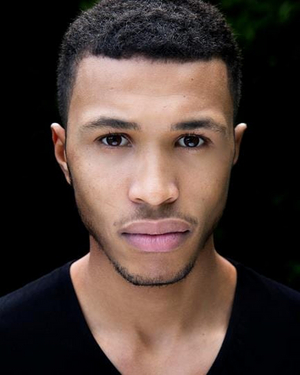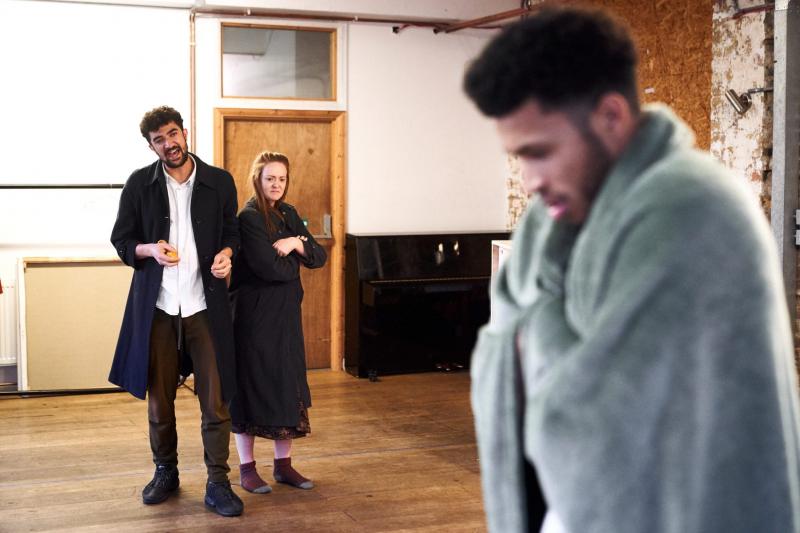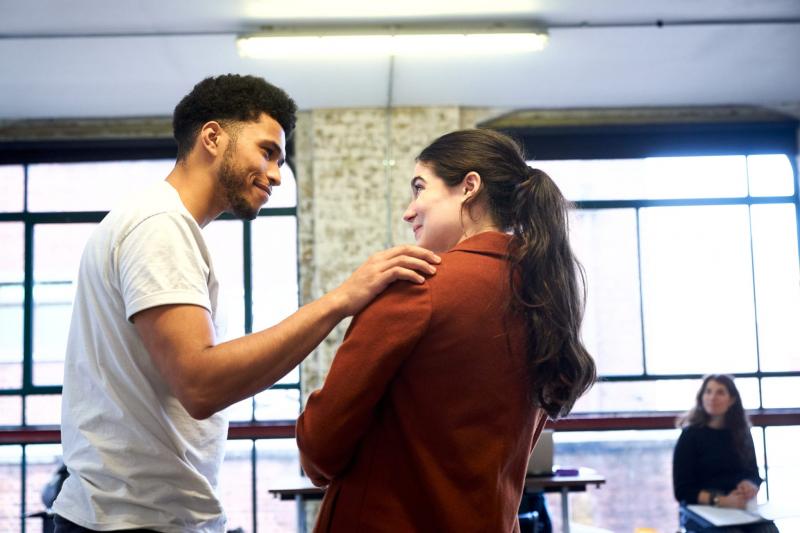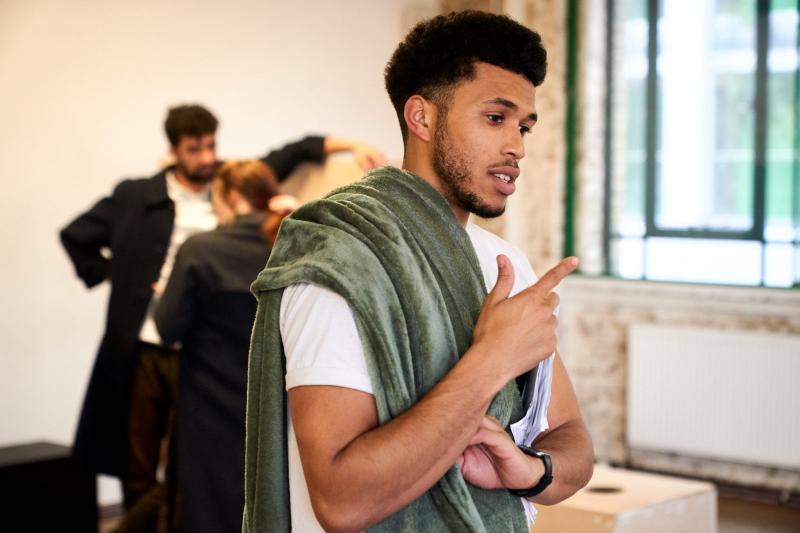Interview: Kwami Odoom Talks HUNGER at the Arcola Theatre

Kwami Odoom talks about his life as an actor and about his role in Hunger, which runs at the Arcola Theatre until 21 December.
You started in the National Youth Theatre - what did that experience give to you?
NYT is amazing because you will never meet so many people who are so similar and so different at the same time, but all really into this one thing - theatre.
I was one of maybe three people at school who liked theatre, so they said go and do the course. Suddenly I was amongst 250 people who all think making theatre is really cool and come from all over the country and from all different backgrounds. It's exciting - really exciting - and inspiring.
It shows in the amount of people I know who formed theatre companies with people from NYT, or got their first play because they know someone from NYT. It really feels like this amazing community of people.
Then doing the rep company gave me safe places to learn - somewhere where I knew the environment and could work on being an actor. I'm really grateful to NYT for everything.
What was it like for you as an inner-city, BAME student?
I don't really use BAME - I identify as mixed-race black. I grew up in Finsbury Park in North London, about 15 minutes away from the National Youth Theatre rehearsal studios, which is an amazing coincidence. So, yes, inner London, born and bred.
I have a feeling that many actors come from a very narrow range of social backgrounds - as someone who does not share that early life, how has it been for you?
I didn't have a private education and I don't have a double-barrelled name, but I would identify as middle-class. I can't really claim to come from humble beginnings.
Now is an amazing time to be a mixed-race or black actor as we're starting to really examine who tells stories, who gets to consume the stories and who they're for. I think we've got a long way to go before there's any kind of parity.
Talking to older black actors, they speak about when they were starting out and they basically just knew all of the black actors - if they didn't get a part, it would go to this guy or this guy. It was all so small that there was very little opportunity to break in.
In this political climate, arts don't have funding - life doesn't have funding! I think we are moving forward in some ways and sliding very far back in others.

What do you see as your own career goal in 10 or 20 years time?
I used to say that I want to play James Bond! I'd just love to be making work that I think is important and telling stories that I want to tell.
I don't want to give myself a target, because it sets up a binary success/fail outcome. What I'd love to do is to look back at 10 or 20 years, and say, "Oh my god, I was excited about that at the time, but I can't believe I got to be involved in that thing!".
I want to look at one of those things that you probably look back on with similar thoughts already. You were in a huge hit with The Barbershop Chronicles.
I wouldn't be surprised if turns out to be the best thing I ever do, both in terms the quality of what it was, but also the experience for me.
It was my first ever job after training with rep - so to go straight from that to a show at The National Theatre was incredible. But not just any show - a show about black African men.
Growing up, I didn't see much representation of my experience of being mixed-race. These days, everyone wants to have interracial couples, but it almost feels like sometimes they know they have to have a black person in there, but they don't want two, so if you have one black person and one white person, there's going to be a mixed-race kid.
But there's a very specific experience - I'm mixed-race, but I identify as a Ghanaian. I know that culture and that world really well and it's a part of who I am. We almost view mixed-race people as just existing in the West sometimes. To play a mixed-race character in a show like that felt amazing to me, because it was not something I thought I'd ever get the chance to do.
To be around that many black men in production was something that I never thought would happen in my life - to do a play with 12 black men in it. They were people I had seen in shows before and they were incredibly kind, incredibly generous - we laughed until we cried pretty much every day in rehearsals, and then every day during the run.
I was turning up to work and getting a paycheque every week, but I would do this for free! OK, I wouldn't, because actors should be paid, but I was having such a good time that I couldn't believe that this is how I make my living.
The opportunities were fantastic - touring to Australia and New Zealand - and weren't part of the original plan. Then we went back to the National. It just kept on getting better.
What's amazing about it as well, was the love in that rehearsal room - the care, the creativity, the brilliant minds, the stage management team who were so on it - it was amazing to start your career and go, "OK - cool. I now know what's possible."
I know that if I'm in rooms that get tense, that it's not just something that I should take - I know it can be amazing, so I go in thinking that I'm going to make it so.

I've often heard actors say that "It was a privilege to work with X or Y", but that's the most comprehensive set of reasons I've heard as to why.
Watching Anthony Welsh on stage, he knows exactly what's needed in any scene. I watched him (and everyone else) thinking that when I get a chance, I'm going to go for that.
You've worked in large theatres and now you're working in a smaller theatre, in its very intimate studio space. What are the differences for you?
In the Arcola, you feel part of the fabric of the theatre - you get the opportunity to make contact with people. It's not better or worse, it's about different possibilities. The Arcola is so cool - the programming is amazing, so varied. To be in a show that's part of this large curation of many things is awesome.
We're downstairs, but the play deals with a young man who feels that the world is closing in on him, getting claustrophobic in the big city. You look at the space and you say, "That's perfect for the story we want to tell."
The thing that got me into theatre is that I love stories. On summer visits to Ghana, once it got too dark, I would be told local folktales that completely captivated me. So being close to an audience gives us the chance to tell a really good story. The way that operates in a community, with its shared understanding, is that the stories broaden perspectives.
It goes back to the issue we talked about earlier - who gets to tell stories. If we live in a world where one narrative gets thrown at us over and over again, we get insular. We need stories from elsewhere to shake things up or challenge us (you don't have to convince), you get a more open, more loving, more outward-looking community. That's a good thing - we should all be striving for it.
Tell me more about the play and your role in it.
Hunger is an adaptation of a novel written in the 1890s about a young man who comes to the big city with dreams of being a writer, but finds the system is not built to sustain his dream. He finds it increasingly hard just to survive.
I play the young man. There are three other actors, who play 11 or 12 characters each.
What attracted you to the role?
There's so much to be mined from it. He's not a perfect person and it feels like he's self-sabotaging at times. What's amazing is that the novel was written so long ago, but it takes barely any tweaking to make it completely relevant for our world.
The way we talk about people receiving benefits and their choices - we talk about it as if that's the issue and it's not. It's that we, as a society, have failed to look after our own and made it so that people have to fight to survive. People say that the novel is timeless, but it's worrying that so little had to be changed in it.
The style is quick and unrelenting - we're all on stage the whole time.

Knut Hamsun is still seen as a controversial writer in Scandinavia - he's the kind of person whose work might attract negative comment, were he better known in the UK.
He's not a lovely person. We spoke about it in rehearsal. Hunger is one of his earlier works, and a lot of his Nazi support and views on women were still in the future. They aren't the focus of the novel, which deals with a man living in poverty.
Amanda [Lomas, the adapter] looked at it and thought about telling the story now and did not just blindly take what Hamsun wrote and put it on stage. We have our own controversial figures in the UK who are revered - but that's not to say that we should blithely say that everyone is doing it. We need to look at what people have done through a critical eye.
If we are going to adapt such works - and the gesture of taking something from the past and showing that little has changed is powerful - we need to say that it is a story for 2019. Saying, "Well, it was of its time", is, for me, an excuse that rarely flies.
It can feel like people are saying that it's all or nothing, but there is a more interesting and vibrant middle road where we can say that the art speaks to me, but the artist is this and that. Suddenly, we get good critical analysis of art. But if you are negatively impacting a group of people who are right here, right now, it's a different thing and you're probably making wrong choices about what you're doing.
The context in which a play is performed is important - we might get a whole load of Hamlets now Trump is in the White House, because the question as to who has the right to lead is critical. Some people might say of a production that, "It's just a show" - I just don't think that's making good art.
Why should the public come and see the show?
I'd say it's because the play speaks really, really clearly to 2019, to the society that we, in the UK and, specifically London, find ourselves in. Saying that things haven't changed is so important - a wake-up call.
What's next for you - James Bond?
Ha - they'll be calling any time soon!
My theatre company, The Pappy Show, have our play Boys at the Southbank Centre in January, but before that, Christmas and some rest and relaxation!
Hunger is at the Arcola Theatre until 21 December.
Read a statement about Knut Hamson by the Arcola Theatre management.
Photos Alex Brenner.
Comments

Videos

